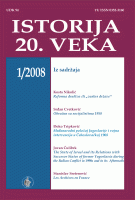MEĐUNARODNI POLOŽAJ JUGOSLAVIJE I VOJNA INTERVENCIJA U ČEHOSLOVAČKOJ 1968
THE INTERNATIONAL POSITION OF YUGOSLAVIA AND THE MILITARY INTERVENTION IN CZECHOSLOVAKIA
Author(s): Đoko TripkovićSubject(s): History
Published by: Institut za savremenu istoriju, Beograd
Keywords: Yugoslavia; Czechoslovakia; Josip Broz Tito; The Prague Spring; military intervention;
Summary/Abstract: At the beginning of 1968, the international position of Yugoslavia seemed relatively stable. The state of global international relations did not suggest that the near future might bring about changes of circumstances that would endanger the Yugoslav position, characterized with the policy of non-alignment and equidistance towards the two confronted military and political blocks. It turned out, however, that such issue occurred in the same year in August, when five countries of the Warsaw Pact conducted military intervention in Czechoslovakia. This action had put a stop to the process of liberal reforms („The Prague Spring”) that was growing stronger in that country in previous months. Yugoslav public was following the reforms in Czechoslovakia with great interest and sympathy. Party and the state elite, led by Josip Broz Tito, supported this course as well. However, Tito estimated and felt that the Czechoslovakian events could lead to a serious crisis, followed by inevitable repercussions on the position of Yugoslavia. Primarily, he had in mind the reaction of the Soviet leadership which was growing ever more suspicious towards the reforms. He had visibly engaged in an attempt to prevent such a development by actively communicating with Soviet and Czechoslovakian leaders. His main goal was to prevent Soviet military intervention, and he failed to do so. Military intervention caused a high level of concern and uncertainty, as Tito and his associates were unable to predict the next Soviet steps. It was estimated that similar action towards Yugoslavia is not probable in the short run, but the long term prognosis was confirming that strong pressure from Moscow was to be expected, in order to bring Yugoslavia back to the socialist camp. Besides the strong condemnation of this act, Yugoslav leadership undertook intensive activities in order to maintain current international position of the country and the inner stability of its regime. Internationally, that meant securing the support of the West, especially of the United States. After two months, that was achieved in a satisfactory manner, leading to the lowering of tensions in relations with the USSR. By the end of the year, Tito has managed to overcome one of the greatest tribulations after the clash with Stalin, to stabilize, at least temporarily, the international position of Yugoslavia, and to secure the direction of its foreign policy.
Journal: Istorija 20. veka
- Issue Year: 2008
- Issue No: 1
- Page Range: 115-131
- Page Count: 16
- Language: Serbian

